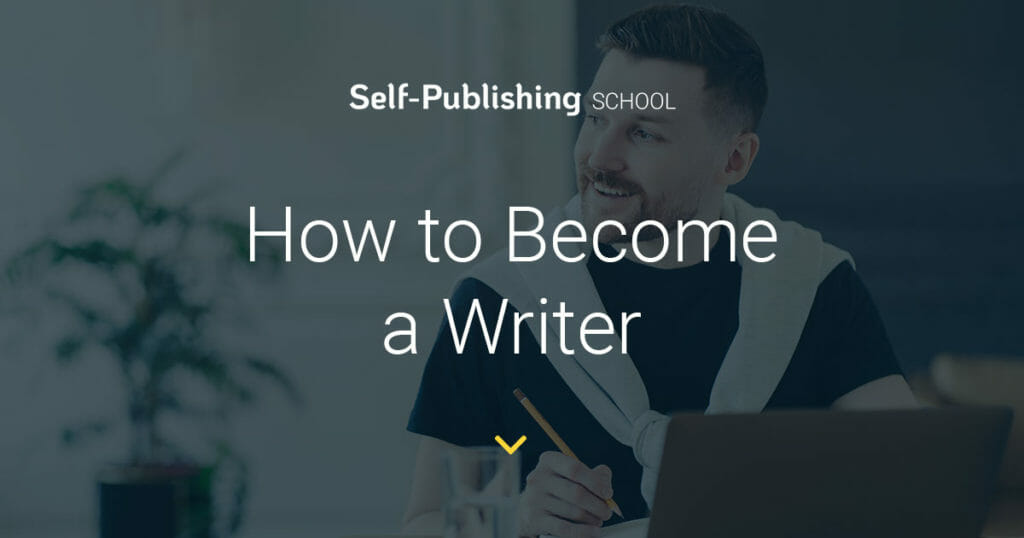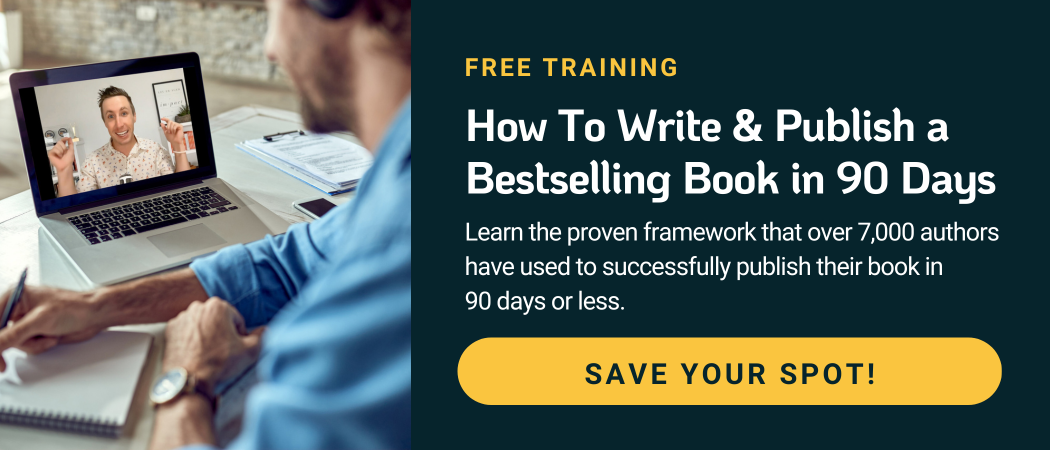When you were a little kid and people asked what you wanted to be when you grew up, what did you say? What did other kids say? A vet, an astronaut, a firefighter, an author.
Becoming a full-time author is a dream so, so many of us have, but the majority of us give up on before we’ve even started. For a lot of people, being a writer is the lofty, if-only dream that we set aside again and again in pursuit of more practical careers.
But what if it was possible? What if you could make a real living creating worlds and telling stories? Would you do it?
How do I start my writing career?
The hardest step in any endeavour is usually the first. Where do we begin? Unfortunately, there are many options for how to launch your writing career. You might start with a strong focus on your author platform–building out your mailing list, queuing social media posts, perfecting your website, getting your headshots taken.
Some authors start fully focused on their writing craft and getting their first book or series solidly planned or written before they even mention it to anyone.
And others might spend a ton of time researching their first move–self-publish or traditional? Which genre or niche? Pen name or real name? How do you launch and market a book?
The truth is, you’re probably going to be doing all of these things simultaneously. Juggling the research, the writing, the admin, the marketing, the platform–the amount of time you spend on each at the beginning will depend on you as an author and your goals, but you’ll likely dip into all three and more of these categories as you’re starting out.
We’ll hit a list of steps for pursuing a new author career later in this post, so keep reading!

How much money do writers make? A Breakdown of Calculating It
The money you can make as an author wildly depends on several factors. One big factor that will affect what you make is whether you self-publish or publish traditionally.
Let’s break that down a little bit.
Again, there are many factors that will affect how much money you make as an author, so I’ll go over the main ones to let you can see the difference monetarily between self-publishing and traditional.
Publishing schedule
One of the most common complaints authors lob at traditional publishing is the publishing turnaround. It typically takes two to three years to traditionally publish a single book, where a self-published author can easily publish three quality novels in one year. This is obviously going to make a huge difference when it comes to how much money you make. The more books you publish, the more sales you’ll get, the bigger your paycheck.
Royalties
The royalty rate greatly favors self-published authors. Depending on where you self-publish, you’ll see around a 40-60% royalty rate per book, in some cases more. Whereas with traditional publishing, your royalty rate is in the range of 10-12% per book.
To put those numbers in perspective, if a traditionally published author and a self-published author each sold a book for $13.99, the traditionally published author might make $0.95, while the self-published author would make around $4.77 for the same book.
With those numbers, why on earth would anyone choose to publish traditionally from a fiscal standpoint? That’s where the up-front advance comes in.
Up-front advance
Traditionally published authors typically receive an advance payment for their book. That payment must be “caught up” to before the author begins receiving royalties per book. The majority of traditionally published books never reach the threshold to receive royalty payments at all. There’s also a chance that the book will never be published, even though the author was paid for it.
With self-publishing, there’s obviously no one there to pay you that advance, but you begin earning those higher royalties with your very first book sale. There also isn’t a chance that you’ll unwillingly shelve your own book and never publish it.
Other revenue streams
Self-published authors can utilize their platform, books, characters, and other creative work for additional income streams a bit easier than a traditionally published author can. This is because a self-published author retains 100% of the rights to their work. They don’t have a publishing house, editor, agent, or marketing team telling them what they can or cannot do with their platform or intellectual property. This means self-published authors can make and sell merchandise, sell short stories using the same characters, produce audiobooks, run sales and specials, and pursue other alternative revenue streams that a traditionally published author might be barred from attempting.
How do I make more money selling books?
What you make from selling your books highly depends. How you create it, how quickly, how you market, how many books you publish a year, the size of your author platform, and countless other factors will affect how much money you bring in from book sales.
The best thing you can do is research, experiment, then settle on a proven system that you don’t have to fiddle around with or fail with over and over again. Once you have a formula that works, stick with it! The guesswork, going over budget and over schedule, and trial-and-error of not having a set process in place can eat into your profits bigtime.
You should also calculate how many books you have to sell to meet your sales goals. Having these specific numbers will help you to keep control of the money you make so you can keep producing books.
Book Profit Calculator
Enter Your Information Below To Calculate
Your Potential Book Sales
Enter your details below to see your personalized book profit estimate!
CONGRATULATIONS
Here's What You'd Earn:
Your profit per book: $20
In 3 months, you'll make: $90,000
In 6 months, you'll make: $180,000
In 1 year, you'll make: $365,000

How to become a writer
So how do you do it? Where do you start? Every author has a different journey based on their preferences, goals, and niches, but here’s a basic rundown of steps in a logical order. This should give you an idea of your own game plan for becoming a career author.
1. Figure out your niche/demographic/genre
Knowing who you’re selling yourself and your writing to is a big step in developing those materials and guiding the way you write your book. Authors might hit several different demographics and genres, and it might change and fluctuate over time. That’s fine! It’s great to stay in touch with how you, your writing, and your audience evolve and respond to those changes.
But—
It’s still really important to know who you’re selling to when you’re starting out.
2. Learn from successful writers
Imitation is the sincerest form of flattery–and one of the quickest ways to learn a trade. Look at writers who are doing what you want to be doing, and emulate their process. If you’re self-publishing, look at successful indie writers, preferably in your genre. How are they marketing? What do their covers look like? Don’t copy their work, but follow them on social media, take note of what you like and don’t like about their writing and platform.
You can also check out classes, webinars, and other events where these authors present or participate to learn from them directly.
The trickiest bit for most new authors to learn, traditional or self-published, is the author platform. If you don’t have experience with things like mailing lists, social media, and content production, it can be a lot to learn! But don’t panic–go one step at a time.
- Branding. “Branding” is one of those words people use that can mean and encompass roughly nine thousand different concepts, but it’s still important. Your brand is essentially what people think of when they think of you. For example, my brand includes short stories, swampscapes, educational writing videos, snarky humor, and rewriting Twilight. Your brand might not be something you sit down and figure out all in one go, but giving some thought to how you’ll brand yourself and your platform at the beginning can give you a big advantage.
- Mailing lists. Mailing lists and newsletters are a cornerstone element of any writer platform. They’re fairly straightforward to set up and maintain, so I definitely recommend this as one of your first stepping stones to building your author platform.
- Social media. Social media is also important! Even if you only have one or two accounts, having a visible presence helps readers connect with you, and it helps you promote your books.
- Content creation. This is more optional, but many writers turn to content creation to build an audience for their writing. For example, I make YouTube videos and I stream on Twitch. You might also give talks, host events, do reading streams, etc.
- Networking. Meeting readers, other authors, and people in and around your genre and industry can throw you in the way of many different opportunities, and it helps to get your name out there. So even before you have a book to sell, keep an eye out for networking opportunities.
4. Write your books…and actually finish them 😉
This is listed fourth, but hopefully you’re writing your books through everything else! That’s why you chose this career, after all. As you grow as a writer, you’ll get quicker and better at producing books. There are many different processes to experiment with and perfect, so try to have patience with yourself through that journey.
5. Make your plan
Keeping control of your schedule and process is going to be imperative. When, where, and how do you write? Do you have self-imposed deadlines? How often are you posting on socials? Some writers like to have their calendar laid out with specifics, while others just wing it. Find a method that works for you to keep track of your progress and publications.
6. Learn how to launch a book successfully
Whether you’re traditionally or self-published, two of your most important events will be your pre-sale and your book launches, so learn how to do them right! A launch strategy can make the difference between a star and a flop book. Many bestseller lists and other accolades are determined by your preorder numbers, so don’t leave that strategy session for after the book is published.
7. Learn how to market a book
Before, during, and after your book launch, you’ll need to be marketing. Even if you’re traditionally published, companies aren’t looking to throw their marketing budget at a newbie writer. Plan on doing most of the legwork yourself. That involves the newsletters, social media campaigns, events, and other marketing elements. Studying up and planning before your book is ready might be a clever use of your time to give you an edge after you’ve launched it.
There is no right or wrong way to be and become a writer. Everyone’s books and audience are unique to them, so only you’ll know what works. Do your research, get things done ahead of time if you can, and don’t give up! What was or will be your first step to becoming a writer? Let us know in a comment!
Want to learn how to become a published author in 90 days?
We have the training if you have the time!
Check out the resource below first to learn more about our courses, AND get a bit of free training as you learn about our method.
After you check out the training, make sure to book a call with one of our Publishing Strategists to learn more about which course is the best for you to teach you how to self-publish your own book, or many books, or use your book as a way to make money!
